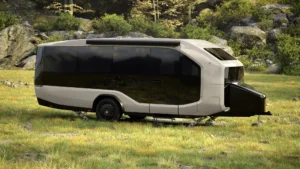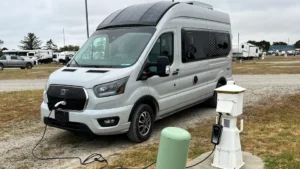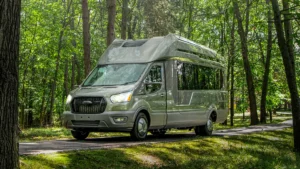The RV industry is buzzing with innovation as electric technology revolutionizes the way we travel. All-electric RVs are promising to combine sustainability with comfort, offering eco-conscious adventurers an exciting new way to hit the road. From high-tech trailers to futuristic camper vans, this new wave of RVing represents a major leap forward. But what’s really out there, and how do these new vehicles stack up?
In this article, we’ll explore the latest all-electric RV models, their standout features, the pros and cons of going electric, and what the future holds for RV enthusiasts.
Lightship AE.1: The Solar-Powered Marvel
Ever dreamed of towing a spaceship-like trailer that runs on sunlight? Say hello to the Lightship AE.1, the sleek, solar-powered RV that looks as cool as it is sustainable. This futuristic rig turns heads on the road while quietly redefining the camping experience with its innovative energy solutions.
The Lightship AE.1 incorporates solar panels to harness renewable energy, powering its luxurious interior amenities without the need for a traditional generator. Its aerodynamic design isn’t just stylish—it’s efficient, helping to extend its range while on the road. Currently available as a limited “Cosmos Edition,” it’s a bold step into the future of RVing.
Price: Available upon inquiry.
Pebble Flow: Luxury Meets Sustainability
Imagine a travel trailer so sleek and futuristic, it feels like it belongs in a sci-fi movie. The Pebble Flow isn’t just an RV—it’s your ticket to off-grid adventures with luxury built into every corner. With its streamlined design, integrated tech, and a battery that keeps you powered for a week, this trailer practically whispers, “Adventure, anyone?”
 The Pebble Flow features a 45-kWh lithium-ion battery built into its floor, allowing for up to seven days of off-grid power. Inside, you’ll find a fully equipped kitchen, a bathroom, and convertible dining and sleeping areas, all of which can be controlled via a mobile app. This trailer blends sustainability with modern convenience, making it a top choice for eco-conscious adventurers who don’t want to sacrifice comfort.
The Pebble Flow features a 45-kWh lithium-ion battery built into its floor, allowing for up to seven days of off-grid power. Inside, you’ll find a fully equipped kitchen, a bathroom, and convertible dining and sleeping areas, all of which can be controlled via a mobile app. This trailer blends sustainability with modern convenience, making it a top choice for eco-conscious adventurers who don’t want to sacrifice comfort.
Price: Starting at $109,000, with high-end models reaching $135,500.
Winnebago eRV2: Compact and Versatile
Meet the Winnebago eRV2, your eco-friendly getaway vehicle perfect for urban escapades and weekend road trips. Think of it as the Swiss Army knife of electric camper vans—compact, versatile, and equipped with all the comforts you need. It’s proof that good things really do come in small, fully charged packages.
 Built on Ford’s eTransit platform, the eRV2 offers a range of approximately 108 miles per charge, making it ideal for shorter trips. The interior is designed with modern amenities, including a kitchenette, a sleeping area, and a clean, minimalist aesthetic. Expected to hit the market in early 2024, it’s an intriguing option for eco-minded RVers.
Built on Ford’s eTransit platform, the eRV2 offers a range of approximately 108 miles per charge, making it ideal for shorter trips. The interior is designed with modern amenities, including a kitchenette, a sleeping area, and a clean, minimalist aesthetic. Expected to hit the market in early 2024, it’s an intriguing option for eco-minded RVers.
Price: Yet to be announced, but it’s sure to attract interest when it launches.
Thor Electric RV Concept: A Glimpse Into the Future
Thor Industries has introduced a Class A motorhome concept featuring a 140 kWh
The Thor Electric RV Concept is like a vision straight out of the future. Packed with a massive battery and a generator for extended range, it’s the RV equivalent of a superhero—powerful, innovative, and ready to save the day on your next road trip. Sure, it’s still a concept, but isn’t dreaming half the fun?
 This Class A motorhome features a 140-kWh battery and a range-extending generator, targeting a range of up to 500 miles. While it’s still in development, the Thor Electric RV Concept shows great promise as a long-range electric motorhome, blending sustainability with the spaciousness and luxury RVers love.
This Class A motorhome features a 140-kWh battery and a range-extending generator, targeting a range of up to 500 miles. While it’s still in development, the Thor Electric RV Concept shows great promise as a long-range electric motorhome, blending sustainability with the spaciousness and luxury RVers love.
Price: Not yet available, but the concept alone is generating excitement.
The Pros and Cons of All-Electric RVs
As exciting as these innovations are, all-electric RVs come with their own set of advantages and challenges. Here’s what you should consider before making the switch:
Pros:
- Environmental Benefits: With zero tailpipe emissions, electric RVs help reduce your carbon footprint and contribute to cleaner air.
- Lower Operating Costs: Electricity is generally cheaper than gasoline or diesel, meaning you save money over time.
- Reduced Maintenance: Electric drivetrains have fewer moving parts, which means less wear and tear—and potentially fewer trips to the mechanic.
- Quiet Operation: Electric motors are nearly silent, making for a more peaceful camping experience and allowing you to immerse yourself in nature without the hum of an engine.
Cons:
- Limited Range: Many electric RVs can’t travel as far as their gas-powered counterparts, requiring careful planning and frequent charging stops.
- Charging Infrastructure: While improving, charging stations are still sparse in remote areas, which could limit your travel options.
- Higher Upfront Costs: The initial price of electric RVs is often significantly higher than traditional models.
- Longer Refueling Times: Charging an electric RV can take hours compared to the minutes it takes to refuel with gas or diesel.
What Does the Future Hold?
While electric RVs aren’t a perfect solution yet, they’re paving the way for a more sustainable future. Advances in battery technology, expanded charging infrastructure, and growing consumer interest in eco-friendly travel are driving this transformation.
For now, electric RVs are best suited for early adopters and eco-conscious travelers willing to navigate the growing pains of a new technology. However, as these vehicles become more accessible and practical, they have the potential to revolutionize the RV industry and make sustainable travel a mainstream choice.
Whether you’re drawn to the luxury of the Pebble Flow, the compact convenience of the eRV2, or the futuristic vision of the Thor Concept, one thing is clear: the future of RVing is electric—and it’s arriving faster than you think.
